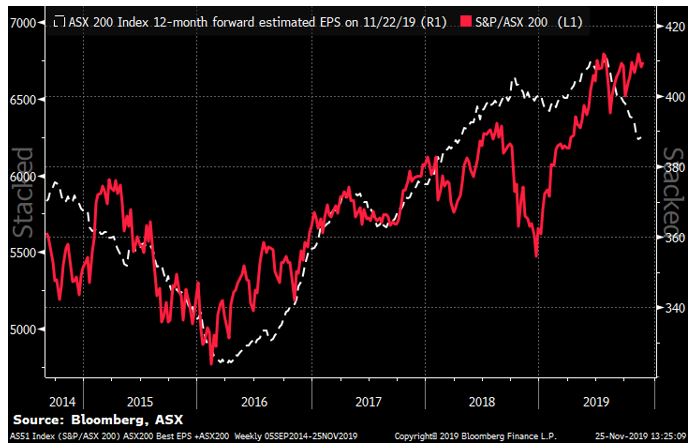From Jonathan Bayes, consultant Chief Investment Officer, Bentleys Wealth Advisors
Economic data released
Australian October Skilled Vacancies continued to fall and are now -8.6% YoY. These numbers point to ongoing full-time job losses, particularly in more highly skilled categories.
The Westpac Australian Leading Indicator for October came in at a 2-year low.
US October Building Permit figures jumped 5% on the month to reach their highest level since 2007. This is terrific news for companies exposed to US residential housing construction such as Boral (BLD), James Hardie (JHX) and Reliance Worldwide (RWC) as it suggests a strong backlog of work ahead in the sector.
Observations from the past week
Afterpay (APT) shares surged +7% this morning on news that the independent auditors report for AUSTRAC found APT to have robust procedures in place to combat potential money laundering and a strong risk culture sufficient to warrant the company being reclassified as ‘low risk’ by AUSTRAC.
Admittedly, we didn’t expect the AUSTRAC report to provide any negative news, but we are still pleased to see the market respond with a strong share price bounce.
Having posted a strong operational update only a week or so ago, APT is now in a great position to close out the year with a strong trading performance over this weekend’s monster Black Friday and Thanksgiving sales in the United States.
We remain optimistic for significantly higher share prices from APT in 2020.
Webjet (WEB) posted a strong operational update at the company AGM last week, pointing to underlying EBITDA of between $157m and $167m in FY2020.
This guidance is in line or even slightly ahead of most analyst forecasts and comes in spite of ongoing softness in both domestic Australian and European consumer activity.
WEB remain confident in the organic growth trajectory of their wholesale Webbeds offering, as do we.
For the 10%+ type ongoing earnings growth WEB should deliver over the coming 3 years, which is probably too conservative, we think a market multiple of 16x earnings is simply too low.
We hope to add to positions should the opportunity arise.
Nufarm (NUF) today warned that 1H 2020 earnings would be significantly lower than those delivered in the already drought-affected 2019 period.
The shares have fallen -18% on the news this morning, leading the share price to have given up almost 80% of the gain made post the surprisingly positive September announcement that the group had sold their Latin American division to Sumitomo Chemical.
Whilst the underlying earnings outlook for NUF remains significantly cloudy, todays reason for downgrade came in large part from both a $9m one-off sales rebate payment, previously unknown to management in the European business, and disappointing sales in the North American market leading to higher inventory.
‘Phase One’ of the U.S/China trade deal, if announced, could aid earnings from the North American division in the coming years, meaning that current earnings are likely near a low point from this division.
Whilst climate change is wreaking havoc with agricultural industries, we do believe that NUF looks increasingly good value at $5 or less, particularly when you consider that Sumitomo Chemical valued NUF’s Latin American division at 11x EBITDA.
At today’s $5 share price, NUF trades on around 5x forward EBITDA even in spite of the likely future earnings stream yet to be booked from the group’s leading omega-3 infused canola seed technology.
I would expect strong support for NUF in the $4.50 to $5.00 range and we will likely add to positions in that region.
What’s interesting?
Though very well known, the chart below leaves it in no doubt that the rally in Australian share prices during 2019 has had precious little to do with corporate earnings.
Australian aggregated forward earnings per share, for the companies in the ASX200, has fallen to an 18-month low and approximately -5% in total.
The ongoing decay in Australian bank sector earnings would have contributed significantly, as would the deterioration in domestic cyclical earnings.
Had the Australian Dollar not weakened modestly, the aggregate figure could have been even worse.
The falling earnings momentum leaves the foundations on which the +23% year-to-date rally in the ASX200 has been built on shifting sands.
The collapse in global bond yields remains the key driver for equity market strength and means that any sharp turn higher in bond yields, perhaps in response to early personal income tax cuts locally, could in fact perversely lead to equity market weakness.
It’s a curious backdrop for investors as we enter 2020.
ASX 200 Earnings per share have fallen -5% to an 18-month low

Looking ahead
- Monday – US Chicago Fed National Activity Index (Oct)
- Tuesday – US Richmond Fed Manufacturing (Nov), US Conference Board Consumer Confidence (Nov)
- Wednesday – US GDP (3Q), US Durable Goods (Oct), US Chicago PMI (Nov)
- Thursday – US Philly Fed Business Outlook (Nov)
- Friday – AU Private Sector (Oct)
The Telstra (TLS) investor day Wednesday will be a feature as will be the IOOF (IFL) AGM on Thursday.
Friday 5pm values
| Index | Change | % | |
| All Ordinaries | 6816 | -82 | -1.2% |
| S&P / ASX 200 | 6709 | -84 | -1.2% |
| Property Trust Index | 1624 | -26 | -1.6% |
| Utilities Index | 7968 | -198 | -2.4% |
| Financials Index | 6032 | -187 | -3.0% |
| Materials Index | 13361 | -57 | -0.4% |
| Energy Index | 11212 | -84 | -0.7% |
Friday Closing Values
| Index | Change | % | |
| U.S. S&P 500 | 3110 | -10 | -0.3% |
| London’s FTSE | 7326 | +24 | +0.3% |
| Japan’s Nikkei | 23112 | -191 | -0.8% |
| Hang Seng | 26595 | +269 | +1.0% |
| China’s Shanghai | 2885 | -6 | -0.2% |
Key Dividends
| Mon 25th November 2019 | N/A |
| Tue 26th November 2019 | N/A |
| Wed 27th November 2019 | Investor Day – Telstra (TLS)
Ex-Div – AMCOR (AMC) |
| Thu 28th November 2019 | AGM – IOOF (IFL) |
| Fri 29th November 2019 | AGM – RESMED (RMD) |
Monday 25 November 2019, 2pm
For more information on the above please contact Bentleys Wealth Advisors directly or on +61 2 9220 0700.
This information is general in nature and is provided by Bentleys Wealth Advisors. It does not take into account the objectives, financial situation or needs of any particular person. You need to consider your financial situation and needs before making any decisions based on this information.



